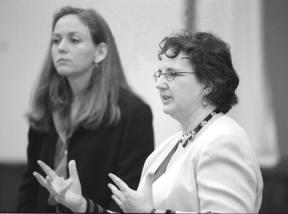A discussion concerning the Patriot Act with two National Public Radio personalities Thursday night could have taken place on air.
It could have, but it didn’t. In an hour-long symposium at the Freeland Hall on the effects of the Patriot Act and other new laws on the freedom of the press, KPLU journalists Bellamy Pailthorpe and Paula Wissel were actually visible to their audience of about 50 people as they explained the shortcomings of government and the media when it comes to getting information to the public.
During her portion of the dinner discussion — which was sponsored by the South Whidbey League of Women Voters — Wissel, a law and government specialist, reduced the USA Patriot Act to its most basic essence when it comes to how it affects the media. The act, passed in the wake of the terrorist attacks on Sept. 11, 2001, was initially intended to help government agencies and law enforcement to better protect the United States against terrorism. Included in the act are increased powers of surveillance for law enforcement and new rules for the detention of suspected terrorists. In addition, Wissel said, the act contains rules that can limit press access to public documents, which she said were part of the current “unprecedented and alarming penchant for government secrecy.”
Wissel said that while she has not yet had any trouble gaining access to records because of the Patriot Act, she said the law plus Attorney General John Ashcroft’s proclivity toward denying media access to public records could make the press less free in the future.
Pailthorpe, who in addition to working as a business and labor reporter for KPLU serves as a board member for the Society for Professional Journalists in Washington, was clear in her objections to the Patriot Act. The act, she said, can bar journalists from looking at any public document that could relate to terrorism.
“Which is kind of broad,” she said.
One example she gave was the Federal Aviation Administration. She said the agency recently took a great deal of the information it used to put on its Web site offline.
Closer to home, she said state transportation officials considered making repair and maintenance data on the Alaska Way Viaduct off limits to the press for fear that terrorists might use it to damage the elevated roadway.
While that might be warranted under some circumstances, she said judgement calls on public information access must be open to scrutiny and reversal.
“What if their judgement is not so great?” she said. “Who’s there to look at it.”
During a lengthy question-and-answer period, topics ranged from military-embedded reporters in Iraq and journalistic objectivity, to Patriot Act-sanctioned searches of library records and collusion between the media and the government.
Freeland resident Jack Eskenazi leveled a strong accusation at the media in general.
“I have the feeling that some of our journalists are sucking up to the government,” he said.
In a way, Wissel agreed. Talking about the journalists who covered the war in Iraq while travelling with U.S. military units, she said that while that arrangement gave reporters safe access to a war zone, their judgement might easily have been colored.
“It’s hard to cover your own war,” she said.
Pailthorpe minced no words on the subject of television coverage of the war.
“I was horrified,” she said.
Both Wissel and Pailthorpe were essentially stumped during one point of the discussion when Clinton resident Rufus Rose asked their opinion on CNN’s alleged suppression of a story about an Iraqi plot to assassinate the king of Jordan and former President George H.W. Bush. Both reporters said they would have a hard time deciding whether putting such a story on air or in print would do more harm than good.
Over the course of the evening, Wissel and Pailthorpe encouraged their audience to be discriminating in their news choices.
The one-night event, titled “Loss of Civil Liberties and Control of the Media” was the last in the League of Women Voters 2002-2003 calendar. The group begins its new event year next month.



